Report on Independent Learning and Research in UK School Education
VerifiedAdded on 2019/12/17
|10
|3349
|487
Report
AI Summary
This report provides an analysis of independent learning and research, focusing on the UK school education system. It begins with an introduction to independent learning and its benefits, followed by a detailed examination of the UK's education system, including its structure from nursery to higher education, compulsory education ages, and the role of government and local authorities. The report highlights key aspects of the education system, such as the national curriculum and the differences between the UK and Iraq's educational cultures. Additionally, it evaluates seminar contributions and the author's learning experiences, including reflections on the educational landscape and family dynamics. The report underscores the importance of research, in-depth analysis, and the evolution of family structures in Britain. The report incorporates personal reflections, cultural comparisons, and an evaluation of seminar contributions to offer a comprehensive understanding of independent learning within the context of UK school education.
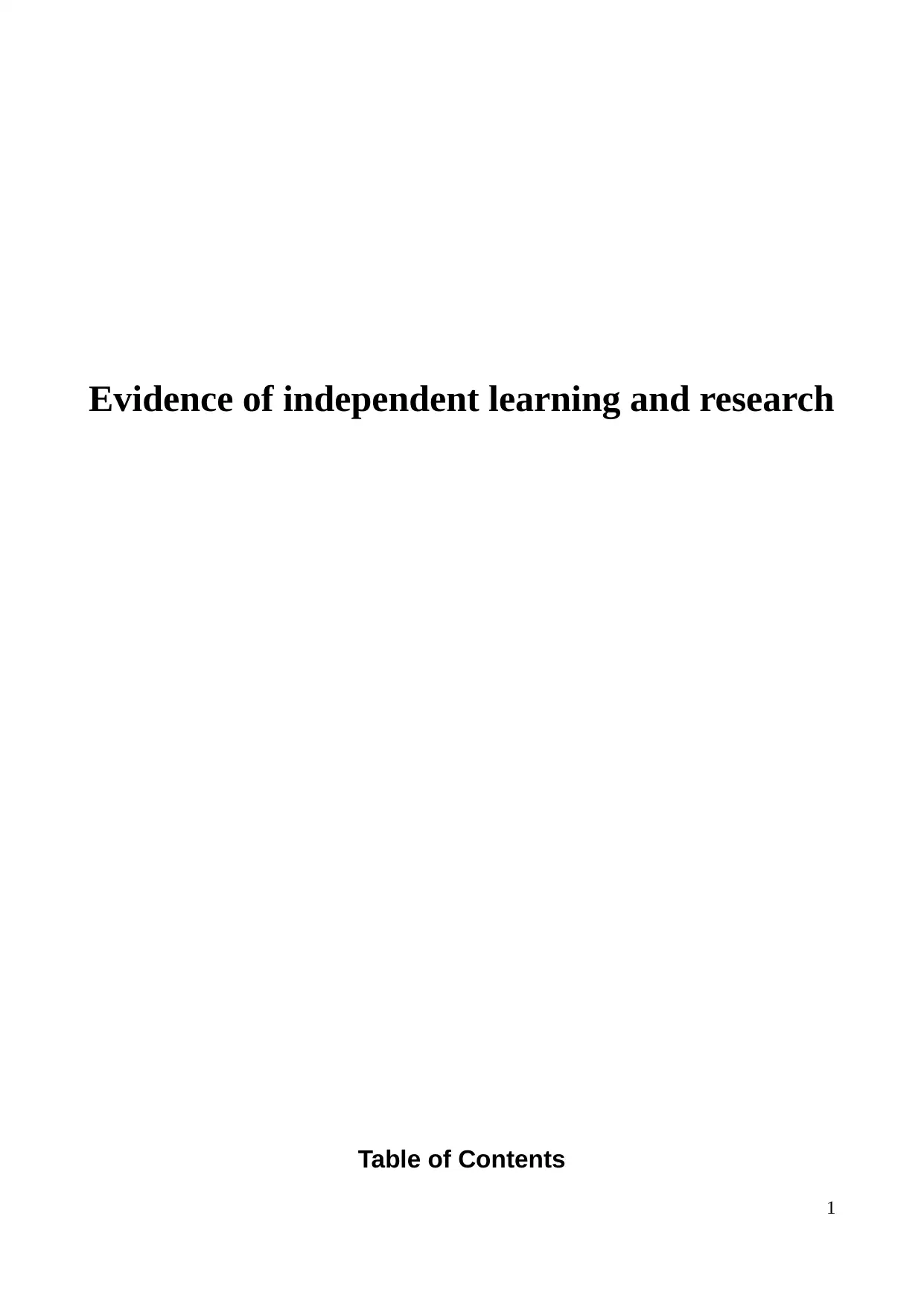
Evidence of independent learning and research
Table of Contents
1
Table of Contents
1
Paraphrase This Document
Need a fresh take? Get an instant paraphrase of this document with our AI Paraphraser
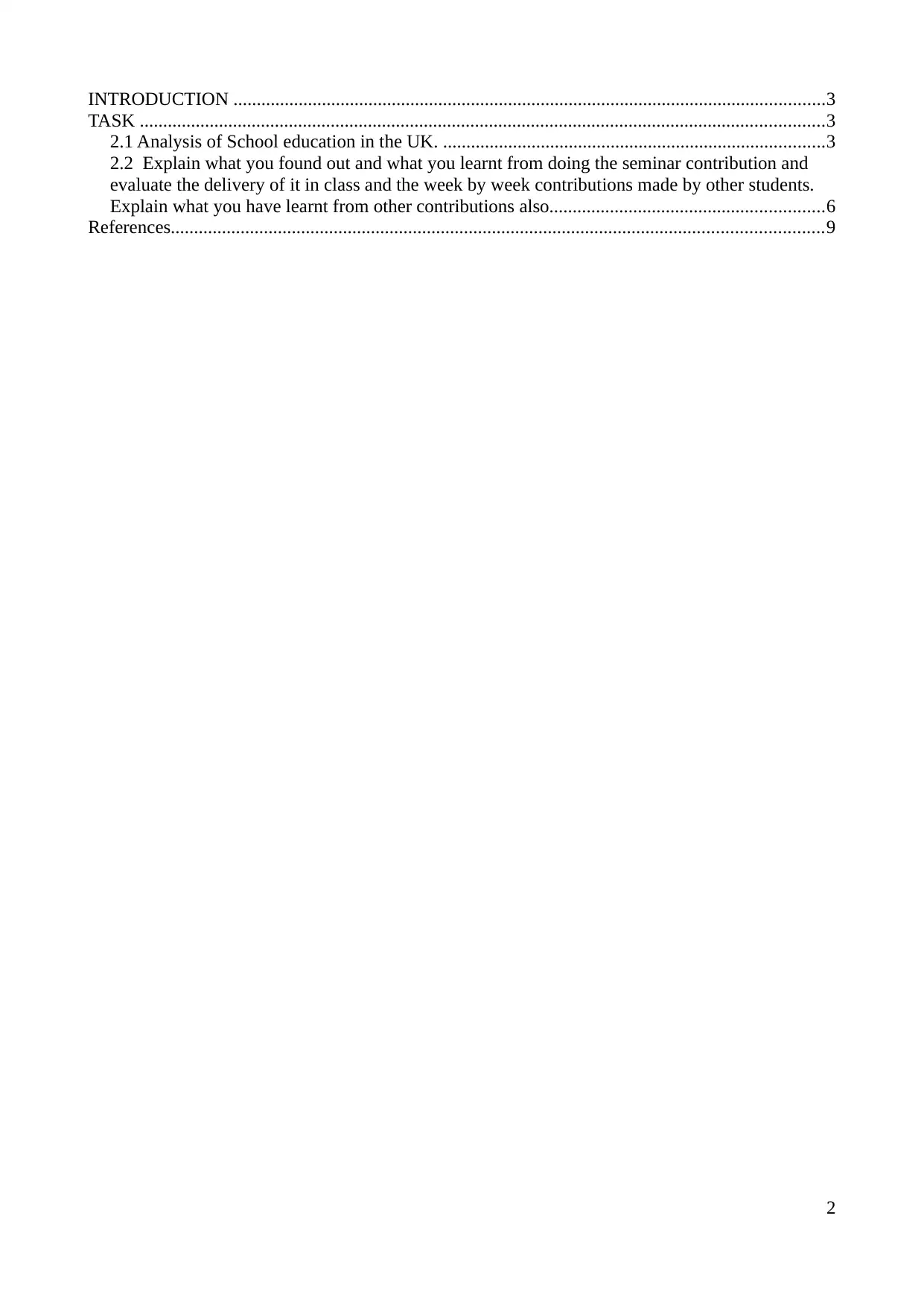
INTRODUCTION ...............................................................................................................................3
TASK ...................................................................................................................................................3
2.1 Analysis of School education in the UK. ..................................................................................3
2.2 Explain what you found out and what you learnt from doing the seminar contribution and
evaluate the delivery of it in class and the week by week contributions made by other students.
Explain what you have learnt from other contributions also...........................................................6
References............................................................................................................................................9
2
TASK ...................................................................................................................................................3
2.1 Analysis of School education in the UK. ..................................................................................3
2.2 Explain what you found out and what you learnt from doing the seminar contribution and
evaluate the delivery of it in class and the week by week contributions made by other students.
Explain what you have learnt from other contributions also...........................................................6
References............................................................................................................................................9
2
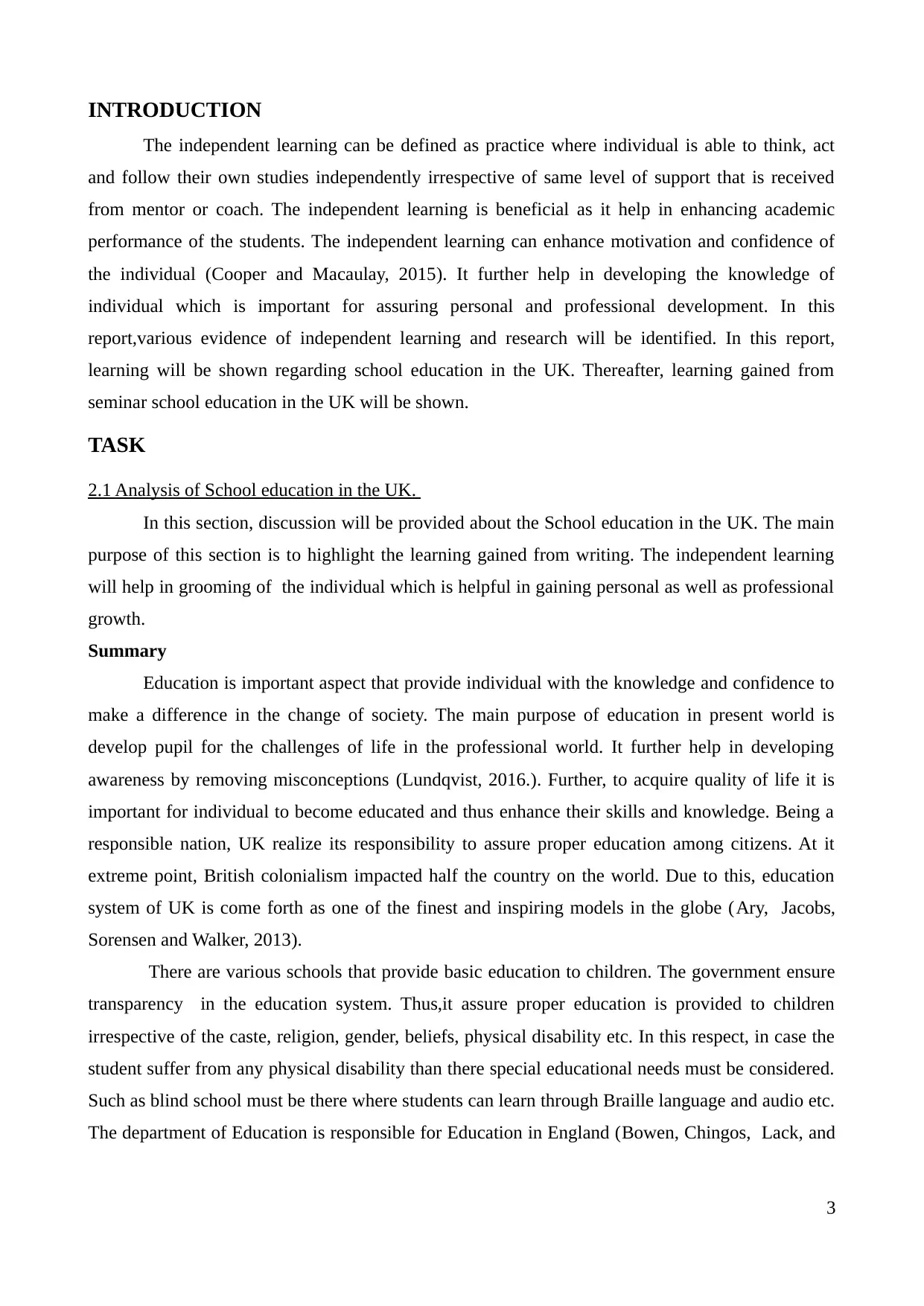
INTRODUCTION
The independent learning can be defined as practice where individual is able to think, act
and follow their own studies independently irrespective of same level of support that is received
from mentor or coach. The independent learning is beneficial as it help in enhancing academic
performance of the students. The independent learning can enhance motivation and confidence of
the individual (Cooper and Macaulay, 2015). It further help in developing the knowledge of
individual which is important for assuring personal and professional development. In this
report,various evidence of independent learning and research will be identified. In this report,
learning will be shown regarding school education in the UK. Thereafter, learning gained from
seminar school education in the UK will be shown.
TASK
2.1 Analysis of School education in the UK.
In this section, discussion will be provided about the School education in the UK. The main
purpose of this section is to highlight the learning gained from writing. The independent learning
will help in grooming of the individual which is helpful in gaining personal as well as professional
growth.
Summary
Education is important aspect that provide individual with the knowledge and confidence to
make a difference in the change of society. The main purpose of education in present world is
develop pupil for the challenges of life in the professional world. It further help in developing
awareness by removing misconceptions (Lundqvist, 2016.). Further, to acquire quality of life it is
important for individual to become educated and thus enhance their skills and knowledge. Being a
responsible nation, UK realize its responsibility to assure proper education among citizens. At it
extreme point, British colonialism impacted half the country on the world. Due to this, education
system of UK is come forth as one of the finest and inspiring models in the globe (Ary, Jacobs,
Sorensen and Walker, 2013).
There are various schools that provide basic education to children. The government ensure
transparency in the education system. Thus,it assure proper education is provided to children
irrespective of the caste, religion, gender, beliefs, physical disability etc. In this respect, in case the
student suffer from any physical disability than there special educational needs must be considered.
Such as blind school must be there where students can learn through Braille language and audio etc.
The department of Education is responsible for Education in England (Bowen, Chingos, Lack, and
3
The independent learning can be defined as practice where individual is able to think, act
and follow their own studies independently irrespective of same level of support that is received
from mentor or coach. The independent learning is beneficial as it help in enhancing academic
performance of the students. The independent learning can enhance motivation and confidence of
the individual (Cooper and Macaulay, 2015). It further help in developing the knowledge of
individual which is important for assuring personal and professional development. In this
report,various evidence of independent learning and research will be identified. In this report,
learning will be shown regarding school education in the UK. Thereafter, learning gained from
seminar school education in the UK will be shown.
TASK
2.1 Analysis of School education in the UK.
In this section, discussion will be provided about the School education in the UK. The main
purpose of this section is to highlight the learning gained from writing. The independent learning
will help in grooming of the individual which is helpful in gaining personal as well as professional
growth.
Summary
Education is important aspect that provide individual with the knowledge and confidence to
make a difference in the change of society. The main purpose of education in present world is
develop pupil for the challenges of life in the professional world. It further help in developing
awareness by removing misconceptions (Lundqvist, 2016.). Further, to acquire quality of life it is
important for individual to become educated and thus enhance their skills and knowledge. Being a
responsible nation, UK realize its responsibility to assure proper education among citizens. At it
extreme point, British colonialism impacted half the country on the world. Due to this, education
system of UK is come forth as one of the finest and inspiring models in the globe (Ary, Jacobs,
Sorensen and Walker, 2013).
There are various schools that provide basic education to children. The government ensure
transparency in the education system. Thus,it assure proper education is provided to children
irrespective of the caste, religion, gender, beliefs, physical disability etc. In this respect, in case the
student suffer from any physical disability than there special educational needs must be considered.
Such as blind school must be there where students can learn through Braille language and audio etc.
The department of Education is responsible for Education in England (Bowen, Chingos, Lack, and
3
⊘ This is a preview!⊘
Do you want full access?
Subscribe today to unlock all pages.

Trusted by 1+ million students worldwide
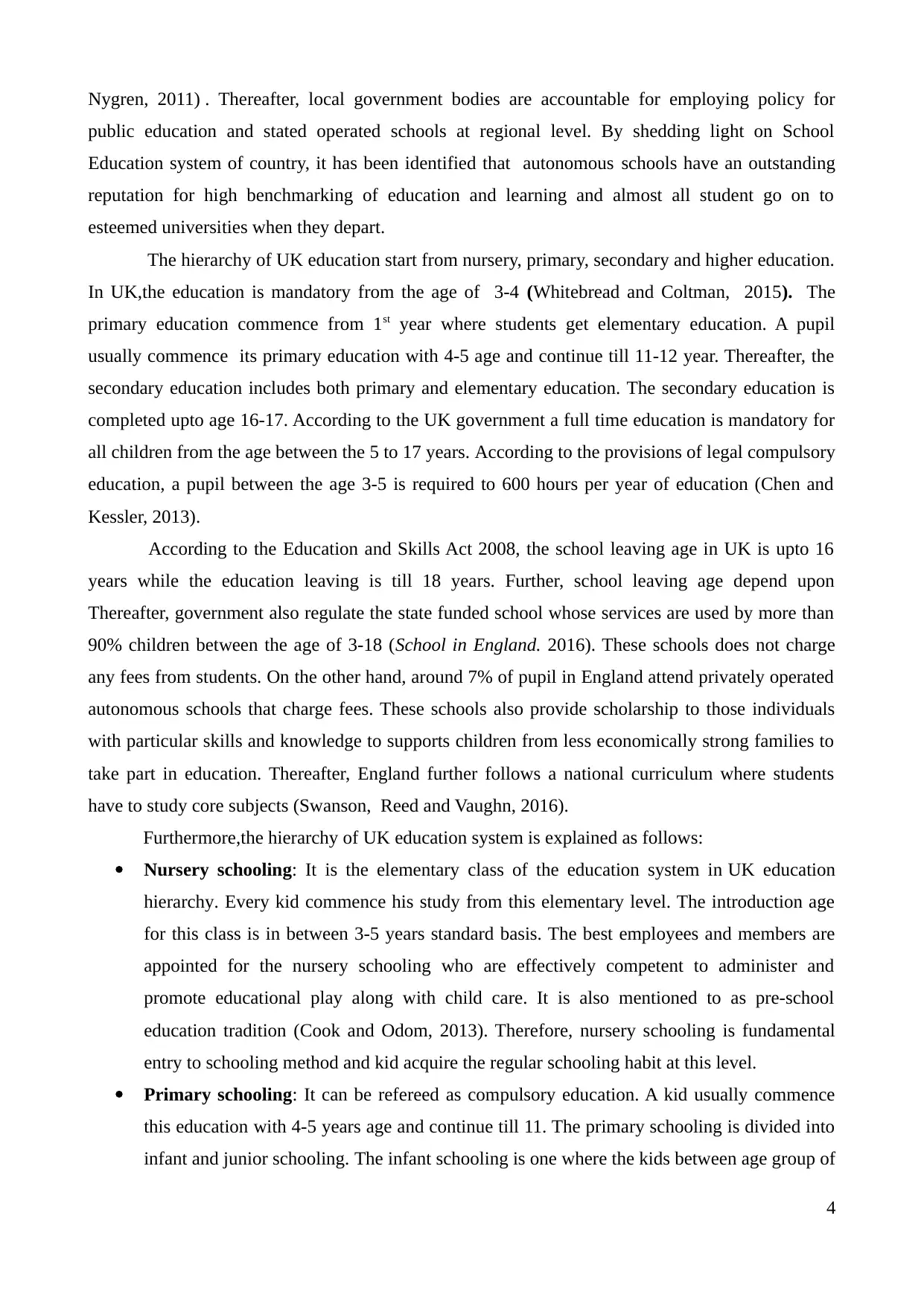
Nygren, 2011) . Thereafter, local government bodies are accountable for employing policy for
public education and stated operated schools at regional level. By shedding light on School
Education system of country, it has been identified that autonomous schools have an outstanding
reputation for high benchmarking of education and learning and almost all student go on to
esteemed universities when they depart.
The hierarchy of UK education start from nursery, primary, secondary and higher education.
In UK,the education is mandatory from the age of 3-4 (Whitebread and Coltman, 2015). The
primary education commence from 1st year where students get elementary education. A pupil
usually commence its primary education with 4-5 age and continue till 11-12 year. Thereafter, the
secondary education includes both primary and elementary education. The secondary education is
completed upto age 16-17. According to the UK government a full time education is mandatory for
all children from the age between the 5 to 17 years. According to the provisions of legal compulsory
education, a pupil between the age 3-5 is required to 600 hours per year of education (Chen and
Kessler, 2013).
According to the Education and Skills Act 2008, the school leaving age in UK is upto 16
years while the education leaving is till 18 years. Further, school leaving age depend upon
Thereafter, government also regulate the state funded school whose services are used by more than
90% children between the age of 3-18 (School in England. 2016). These schools does not charge
any fees from students. On the other hand, around 7% of pupil in England attend privately operated
autonomous schools that charge fees. These schools also provide scholarship to those individuals
with particular skills and knowledge to supports children from less economically strong families to
take part in education. Thereafter, England further follows a national curriculum where students
have to study core subjects (Swanson, Reed and Vaughn, 2016).
Furthermore,the hierarchy of UK education system is explained as follows:
Nursery schooling: It is the elementary class of the education system in UK education
hierarchy. Every kid commence his study from this elementary level. The introduction age
for this class is in between 3-5 years standard basis. The best employees and members are
appointed for the nursery schooling who are effectively competent to administer and
promote educational play along with child care. It is also mentioned to as pre-school
education tradition (Cook and Odom, 2013). Therefore, nursery schooling is fundamental
entry to schooling method and kid acquire the regular schooling habit at this level.
Primary schooling: It can be refereed as compulsory education. A kid usually commence
this education with 4-5 years age and continue till 11. The primary schooling is divided into
infant and junior schooling. The infant schooling is one where the kids between age group of
4
public education and stated operated schools at regional level. By shedding light on School
Education system of country, it has been identified that autonomous schools have an outstanding
reputation for high benchmarking of education and learning and almost all student go on to
esteemed universities when they depart.
The hierarchy of UK education start from nursery, primary, secondary and higher education.
In UK,the education is mandatory from the age of 3-4 (Whitebread and Coltman, 2015). The
primary education commence from 1st year where students get elementary education. A pupil
usually commence its primary education with 4-5 age and continue till 11-12 year. Thereafter, the
secondary education includes both primary and elementary education. The secondary education is
completed upto age 16-17. According to the UK government a full time education is mandatory for
all children from the age between the 5 to 17 years. According to the provisions of legal compulsory
education, a pupil between the age 3-5 is required to 600 hours per year of education (Chen and
Kessler, 2013).
According to the Education and Skills Act 2008, the school leaving age in UK is upto 16
years while the education leaving is till 18 years. Further, school leaving age depend upon
Thereafter, government also regulate the state funded school whose services are used by more than
90% children between the age of 3-18 (School in England. 2016). These schools does not charge
any fees from students. On the other hand, around 7% of pupil in England attend privately operated
autonomous schools that charge fees. These schools also provide scholarship to those individuals
with particular skills and knowledge to supports children from less economically strong families to
take part in education. Thereafter, England further follows a national curriculum where students
have to study core subjects (Swanson, Reed and Vaughn, 2016).
Furthermore,the hierarchy of UK education system is explained as follows:
Nursery schooling: It is the elementary class of the education system in UK education
hierarchy. Every kid commence his study from this elementary level. The introduction age
for this class is in between 3-5 years standard basis. The best employees and members are
appointed for the nursery schooling who are effectively competent to administer and
promote educational play along with child care. It is also mentioned to as pre-school
education tradition (Cook and Odom, 2013). Therefore, nursery schooling is fundamental
entry to schooling method and kid acquire the regular schooling habit at this level.
Primary schooling: It can be refereed as compulsory education. A kid usually commence
this education with 4-5 years age and continue till 11. The primary schooling is divided into
infant and junior schooling. The infant schooling is one where the kids between age group of
4
Paraphrase This Document
Need a fresh take? Get an instant paraphrase of this document with our AI Paraphraser
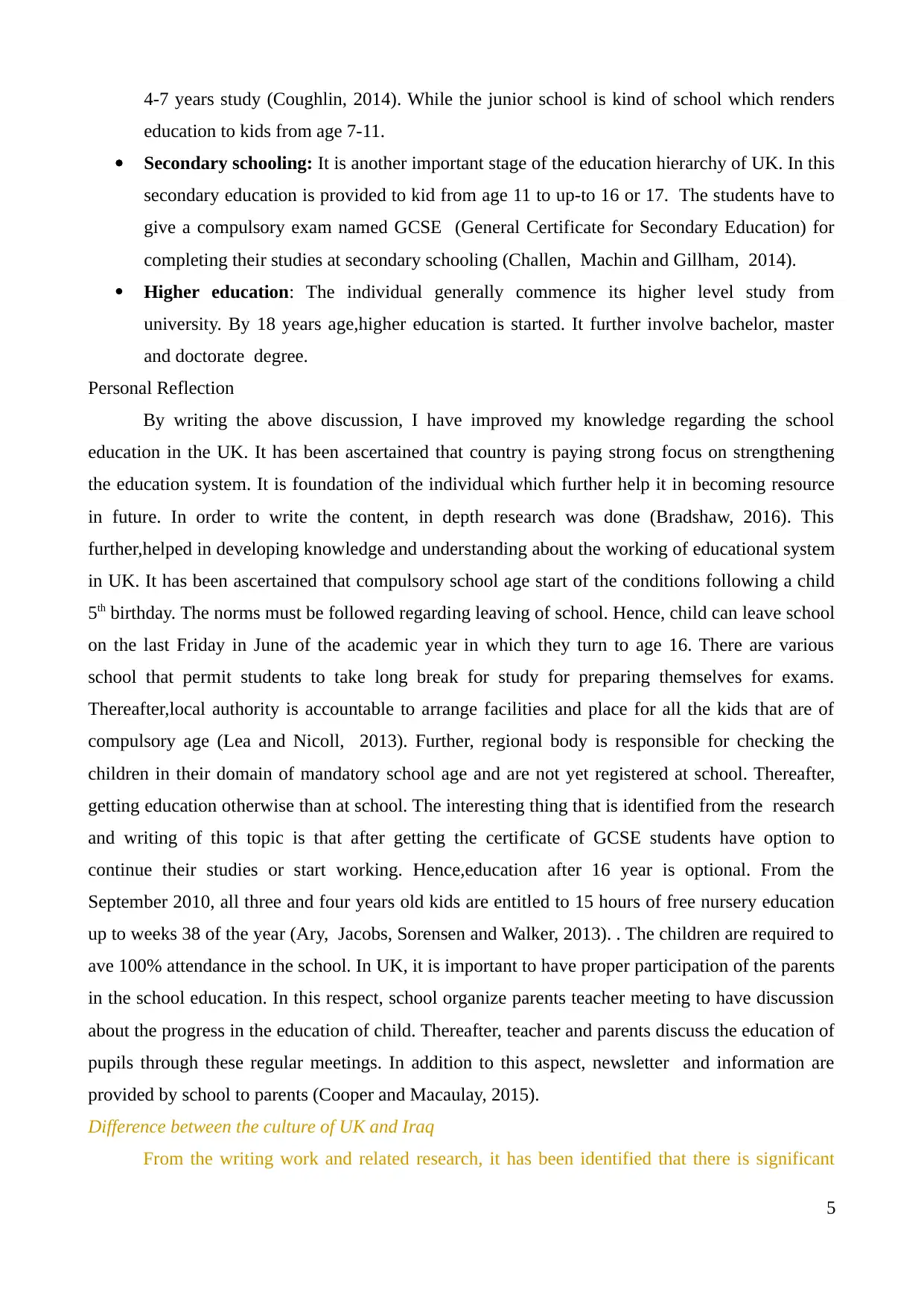
4-7 years study (Coughlin, 2014). While the junior school is kind of school which renders
education to kids from age 7-11.
Secondary schooling: It is another important stage of the education hierarchy of UK. In this
secondary education is provided to kid from age 11 to up-to 16 or 17. The students have to
give a compulsory exam named GCSE (General Certificate for Secondary Education) for
completing their studies at secondary schooling (Challen, Machin and Gillham, 2014).
Higher education: The individual generally commence its higher level study from
university. By 18 years age,higher education is started. It further involve bachelor, master
and doctorate degree.
Personal Reflection
By writing the above discussion, I have improved my knowledge regarding the school
education in the UK. It has been ascertained that country is paying strong focus on strengthening
the education system. It is foundation of the individual which further help it in becoming resource
in future. In order to write the content, in depth research was done (Bradshaw, 2016). This
further,helped in developing knowledge and understanding about the working of educational system
in UK. It has been ascertained that compulsory school age start of the conditions following a child
5th birthday. The norms must be followed regarding leaving of school. Hence, child can leave school
on the last Friday in June of the academic year in which they turn to age 16. There are various
school that permit students to take long break for study for preparing themselves for exams.
Thereafter,local authority is accountable to arrange facilities and place for all the kids that are of
compulsory age (Lea and Nicoll, 2013). Further, regional body is responsible for checking the
children in their domain of mandatory school age and are not yet registered at school. Thereafter,
getting education otherwise than at school. The interesting thing that is identified from the research
and writing of this topic is that after getting the certificate of GCSE students have option to
continue their studies or start working. Hence,education after 16 year is optional. From the
September 2010, all three and four years old kids are entitled to 15 hours of free nursery education
up to weeks 38 of the year (Ary, Jacobs, Sorensen and Walker, 2013). . The children are required to
ave 100% attendance in the school. In UK, it is important to have proper participation of the parents
in the school education. In this respect, school organize parents teacher meeting to have discussion
about the progress in the education of child. Thereafter, teacher and parents discuss the education of
pupils through these regular meetings. In addition to this aspect, newsletter and information are
provided by school to parents (Cooper and Macaulay, 2015).
Difference between the culture of UK and Iraq
From the writing work and related research, it has been identified that there is significant
5
education to kids from age 7-11.
Secondary schooling: It is another important stage of the education hierarchy of UK. In this
secondary education is provided to kid from age 11 to up-to 16 or 17. The students have to
give a compulsory exam named GCSE (General Certificate for Secondary Education) for
completing their studies at secondary schooling (Challen, Machin and Gillham, 2014).
Higher education: The individual generally commence its higher level study from
university. By 18 years age,higher education is started. It further involve bachelor, master
and doctorate degree.
Personal Reflection
By writing the above discussion, I have improved my knowledge regarding the school
education in the UK. It has been ascertained that country is paying strong focus on strengthening
the education system. It is foundation of the individual which further help it in becoming resource
in future. In order to write the content, in depth research was done (Bradshaw, 2016). This
further,helped in developing knowledge and understanding about the working of educational system
in UK. It has been ascertained that compulsory school age start of the conditions following a child
5th birthday. The norms must be followed regarding leaving of school. Hence, child can leave school
on the last Friday in June of the academic year in which they turn to age 16. There are various
school that permit students to take long break for study for preparing themselves for exams.
Thereafter,local authority is accountable to arrange facilities and place for all the kids that are of
compulsory age (Lea and Nicoll, 2013). Further, regional body is responsible for checking the
children in their domain of mandatory school age and are not yet registered at school. Thereafter,
getting education otherwise than at school. The interesting thing that is identified from the research
and writing of this topic is that after getting the certificate of GCSE students have option to
continue their studies or start working. Hence,education after 16 year is optional. From the
September 2010, all three and four years old kids are entitled to 15 hours of free nursery education
up to weeks 38 of the year (Ary, Jacobs, Sorensen and Walker, 2013). . The children are required to
ave 100% attendance in the school. In UK, it is important to have proper participation of the parents
in the school education. In this respect, school organize parents teacher meeting to have discussion
about the progress in the education of child. Thereafter, teacher and parents discuss the education of
pupils through these regular meetings. In addition to this aspect, newsletter and information are
provided by school to parents (Cooper and Macaulay, 2015).
Difference between the culture of UK and Iraq
From the writing work and related research, it has been identified that there is significant
5
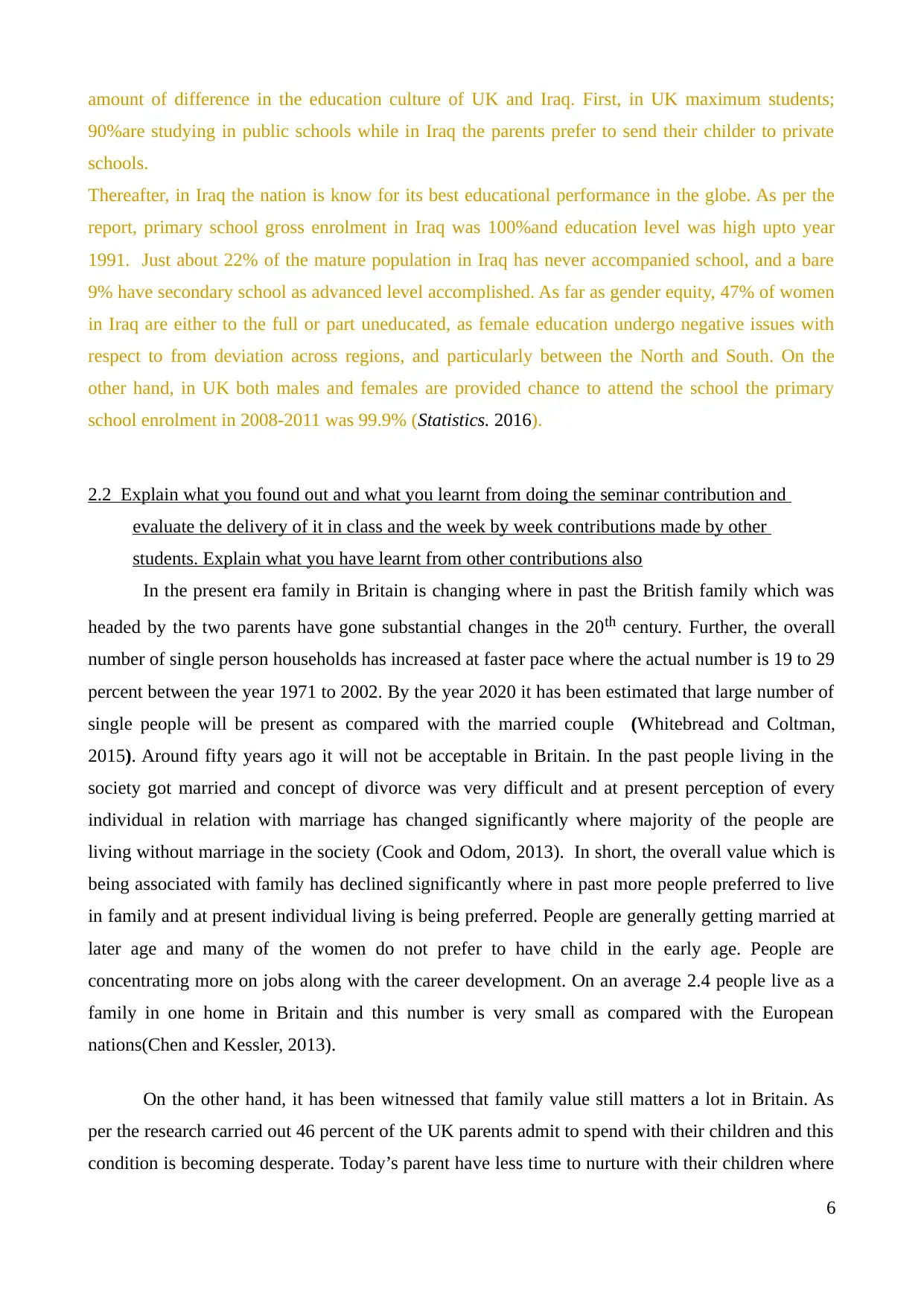
amount of difference in the education culture of UK and Iraq. First, in UK maximum students;
90%are studying in public schools while in Iraq the parents prefer to send their childer to private
schools.
Thereafter, in Iraq the nation is know for its best educational performance in the globe. As per the
report, primary school gross enrolment in Iraq was 100%and education level was high upto year
1991. Just about 22% of the mature population in Iraq has never accompanied school, and a bare
9% have secondary school as advanced level accomplished. As far as gender equity, 47% of women
in Iraq are either to the full or part uneducated, as female education undergo negative issues with
respect to from deviation across regions, and particularly between the North and South. On the
other hand, in UK both males and females are provided chance to attend the school the primary
school enrolment in 2008-2011 was 99.9% (Statistics. 2016).
2.2 Explain what you found out and what you learnt from doing the seminar contribution and
evaluate the delivery of it in class and the week by week contributions made by other
students. Explain what you have learnt from other contributions also
In the present era family in Britain is changing where in past the British family which was
headed by the two parents have gone substantial changes in the 20th century. Further, the overall
number of single person households has increased at faster pace where the actual number is 19 to 29
percent between the year 1971 to 2002. By the year 2020 it has been estimated that large number of
single people will be present as compared with the married couple (Whitebread and Coltman,
2015). Around fifty years ago it will not be acceptable in Britain. In the past people living in the
society got married and concept of divorce was very difficult and at present perception of every
individual in relation with marriage has changed significantly where majority of the people are
living without marriage in the society (Cook and Odom, 2013). In short, the overall value which is
being associated with family has declined significantly where in past more people preferred to live
in family and at present individual living is being preferred. People are generally getting married at
later age and many of the women do not prefer to have child in the early age. People are
concentrating more on jobs along with the career development. On an average 2.4 people live as a
family in one home in Britain and this number is very small as compared with the European
nations(Chen and Kessler, 2013).
On the other hand, it has been witnessed that family value still matters a lot in Britain. As
per the research carried out 46 percent of the UK parents admit to spend with their children and this
condition is becoming desperate. Today’s parent have less time to nurture with their children where
6
90%are studying in public schools while in Iraq the parents prefer to send their childer to private
schools.
Thereafter, in Iraq the nation is know for its best educational performance in the globe. As per the
report, primary school gross enrolment in Iraq was 100%and education level was high upto year
1991. Just about 22% of the mature population in Iraq has never accompanied school, and a bare
9% have secondary school as advanced level accomplished. As far as gender equity, 47% of women
in Iraq are either to the full or part uneducated, as female education undergo negative issues with
respect to from deviation across regions, and particularly between the North and South. On the
other hand, in UK both males and females are provided chance to attend the school the primary
school enrolment in 2008-2011 was 99.9% (Statistics. 2016).
2.2 Explain what you found out and what you learnt from doing the seminar contribution and
evaluate the delivery of it in class and the week by week contributions made by other
students. Explain what you have learnt from other contributions also
In the present era family in Britain is changing where in past the British family which was
headed by the two parents have gone substantial changes in the 20th century. Further, the overall
number of single person households has increased at faster pace where the actual number is 19 to 29
percent between the year 1971 to 2002. By the year 2020 it has been estimated that large number of
single people will be present as compared with the married couple (Whitebread and Coltman,
2015). Around fifty years ago it will not be acceptable in Britain. In the past people living in the
society got married and concept of divorce was very difficult and at present perception of every
individual in relation with marriage has changed significantly where majority of the people are
living without marriage in the society (Cook and Odom, 2013). In short, the overall value which is
being associated with family has declined significantly where in past more people preferred to live
in family and at present individual living is being preferred. People are generally getting married at
later age and many of the women do not prefer to have child in the early age. People are
concentrating more on jobs along with the career development. On an average 2.4 people live as a
family in one home in Britain and this number is very small as compared with the European
nations(Chen and Kessler, 2013).
On the other hand, it has been witnessed that family value still matters a lot in Britain. As
per the research carried out 46 percent of the UK parents admit to spend with their children and this
condition is becoming desperate. Today’s parent have less time to nurture with their children where
6
⊘ This is a preview!⊘
Do you want full access?
Subscribe today to unlock all pages.

Trusted by 1+ million students worldwide
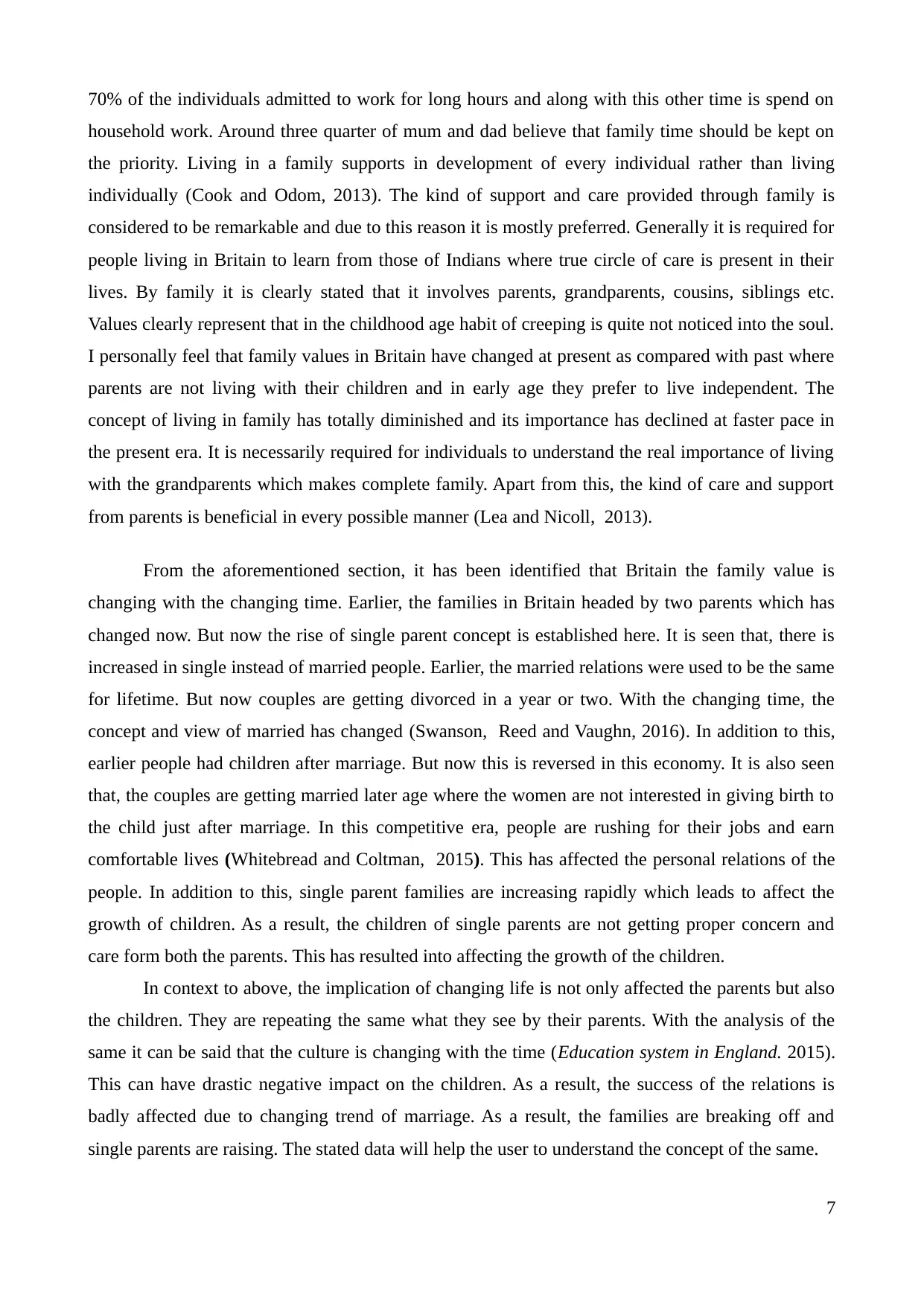
70% of the individuals admitted to work for long hours and along with this other time is spend on
household work. Around three quarter of mum and dad believe that family time should be kept on
the priority. Living in a family supports in development of every individual rather than living
individually (Cook and Odom, 2013). The kind of support and care provided through family is
considered to be remarkable and due to this reason it is mostly preferred. Generally it is required for
people living in Britain to learn from those of Indians where true circle of care is present in their
lives. By family it is clearly stated that it involves parents, grandparents, cousins, siblings etc.
Values clearly represent that in the childhood age habit of creeping is quite not noticed into the soul.
I personally feel that family values in Britain have changed at present as compared with past where
parents are not living with their children and in early age they prefer to live independent. The
concept of living in family has totally diminished and its importance has declined at faster pace in
the present era. It is necessarily required for individuals to understand the real importance of living
with the grandparents which makes complete family. Apart from this, the kind of care and support
from parents is beneficial in every possible manner (Lea and Nicoll, 2013).
From the aforementioned section, it has been identified that Britain the family value is
changing with the changing time. Earlier, the families in Britain headed by two parents which has
changed now. But now the rise of single parent concept is established here. It is seen that, there is
increased in single instead of married people. Earlier, the married relations were used to be the same
for lifetime. But now couples are getting divorced in a year or two. With the changing time, the
concept and view of married has changed (Swanson, Reed and Vaughn, 2016). In addition to this,
earlier people had children after marriage. But now this is reversed in this economy. It is also seen
that, the couples are getting married later age where the women are not interested in giving birth to
the child just after marriage. In this competitive era, people are rushing for their jobs and earn
comfortable lives (Whitebread and Coltman, 2015). This has affected the personal relations of the
people. In addition to this, single parent families are increasing rapidly which leads to affect the
growth of children. As a result, the children of single parents are not getting proper concern and
care form both the parents. This has resulted into affecting the growth of the children.
In context to above, the implication of changing life is not only affected the parents but also
the children. They are repeating the same what they see by their parents. With the analysis of the
same it can be said that the culture is changing with the time (Education system in England. 2015).
This can have drastic negative impact on the children. As a result, the success of the relations is
badly affected due to changing trend of marriage. As a result, the families are breaking off and
single parents are raising. The stated data will help the user to understand the concept of the same.
7
household work. Around three quarter of mum and dad believe that family time should be kept on
the priority. Living in a family supports in development of every individual rather than living
individually (Cook and Odom, 2013). The kind of support and care provided through family is
considered to be remarkable and due to this reason it is mostly preferred. Generally it is required for
people living in Britain to learn from those of Indians where true circle of care is present in their
lives. By family it is clearly stated that it involves parents, grandparents, cousins, siblings etc.
Values clearly represent that in the childhood age habit of creeping is quite not noticed into the soul.
I personally feel that family values in Britain have changed at present as compared with past where
parents are not living with their children and in early age they prefer to live independent. The
concept of living in family has totally diminished and its importance has declined at faster pace in
the present era. It is necessarily required for individuals to understand the real importance of living
with the grandparents which makes complete family. Apart from this, the kind of care and support
from parents is beneficial in every possible manner (Lea and Nicoll, 2013).
From the aforementioned section, it has been identified that Britain the family value is
changing with the changing time. Earlier, the families in Britain headed by two parents which has
changed now. But now the rise of single parent concept is established here. It is seen that, there is
increased in single instead of married people. Earlier, the married relations were used to be the same
for lifetime. But now couples are getting divorced in a year or two. With the changing time, the
concept and view of married has changed (Swanson, Reed and Vaughn, 2016). In addition to this,
earlier people had children after marriage. But now this is reversed in this economy. It is also seen
that, the couples are getting married later age where the women are not interested in giving birth to
the child just after marriage. In this competitive era, people are rushing for their jobs and earn
comfortable lives (Whitebread and Coltman, 2015). This has affected the personal relations of the
people. In addition to this, single parent families are increasing rapidly which leads to affect the
growth of children. As a result, the children of single parents are not getting proper concern and
care form both the parents. This has resulted into affecting the growth of the children.
In context to above, the implication of changing life is not only affected the parents but also
the children. They are repeating the same what they see by their parents. With the analysis of the
same it can be said that the culture is changing with the time (Education system in England. 2015).
This can have drastic negative impact on the children. As a result, the success of the relations is
badly affected due to changing trend of marriage. As a result, the families are breaking off and
single parents are raising. The stated data will help the user to understand the concept of the same.
7
Paraphrase This Document
Need a fresh take? Get an instant paraphrase of this document with our AI Paraphraser
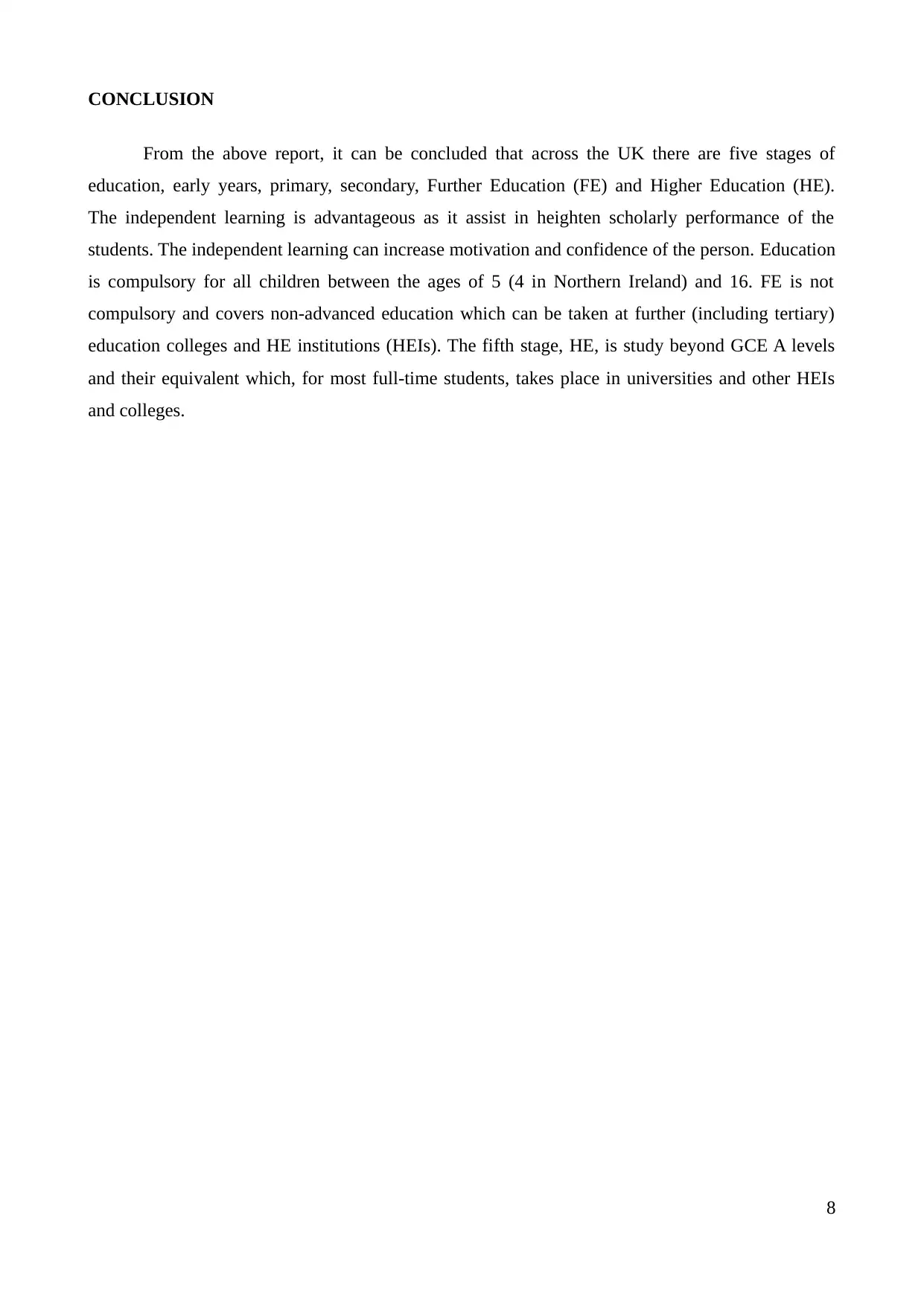
CONCLUSION
From the above report, it can be concluded that across the UK there are five stages of
education, early years, primary, secondary, Further Education (FE) and Higher Education (HE).
The independent learning is advantageous as it assist in heighten scholarly performance of the
students. The independent learning can increase motivation and confidence of the person. Education
is compulsory for all children between the ages of 5 (4 in Northern Ireland) and 16. FE is not
compulsory and covers non-advanced education which can be taken at further (including tertiary)
education colleges and HE institutions (HEIs). The fifth stage, HE, is study beyond GCE A levels
and their equivalent which, for most full-time students, takes place in universities and other HEIs
and colleges.
8
From the above report, it can be concluded that across the UK there are five stages of
education, early years, primary, secondary, Further Education (FE) and Higher Education (HE).
The independent learning is advantageous as it assist in heighten scholarly performance of the
students. The independent learning can increase motivation and confidence of the person. Education
is compulsory for all children between the ages of 5 (4 in Northern Ireland) and 16. FE is not
compulsory and covers non-advanced education which can be taken at further (including tertiary)
education colleges and HE institutions (HEIs). The fifth stage, HE, is study beyond GCE A levels
and their equivalent which, for most full-time students, takes place in universities and other HEIs
and colleges.
8
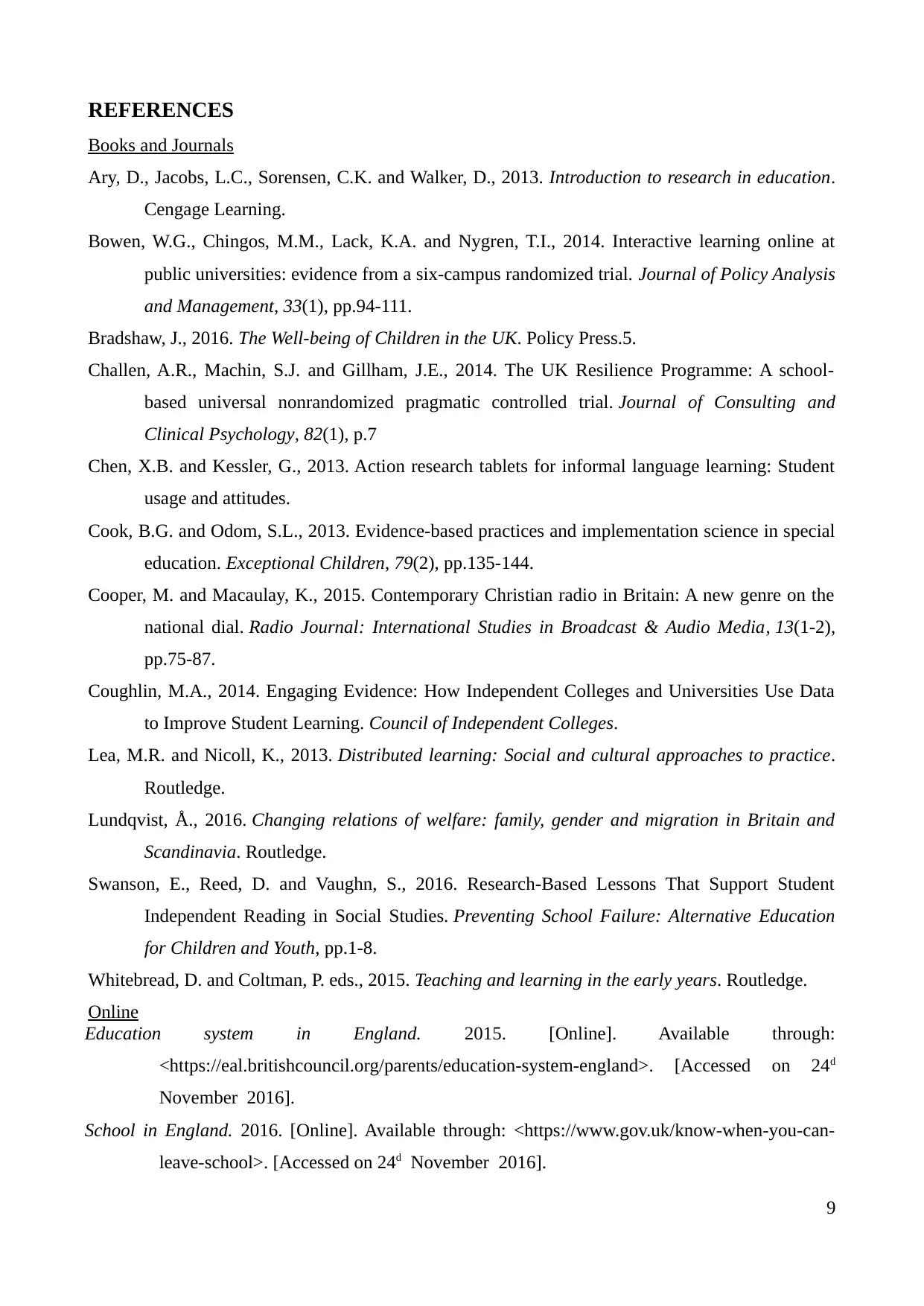
REFERENCES
Books and Journals
Ary, D., Jacobs, L.C., Sorensen, C.K. and Walker, D., 2013. Introduction to research in education.
Cengage Learning.
Bowen, W.G., Chingos, M.M., Lack, K.A. and Nygren, T.I., 2014. Interactive learning online at
public universities: evidence from a six‐campus randomized trial. Journal of Policy Analysis
and Management, 33(1), pp.94-111.
Bradshaw, J., 2016. The Well-being of Children in the UK. Policy Press.5.
Challen, A.R., Machin, S.J. and Gillham, J.E., 2014. The UK Resilience Programme: A school-
based universal nonrandomized pragmatic controlled trial. Journal of Consulting and
Clinical Psychology, 82(1), p.7
Chen, X.B. and Kessler, G., 2013. Action research tablets for informal language learning: Student
usage and attitudes.
Cook, B.G. and Odom, S.L., 2013. Evidence-based practices and implementation science in special
education. Exceptional Children, 79(2), pp.135-144.
Cooper, M. and Macaulay, K., 2015. Contemporary Christian radio in Britain: A new genre on the
national dial. Radio Journal: International Studies in Broadcast & Audio Media, 13(1-2),
pp.75-87.
Coughlin, M.A., 2014. Engaging Evidence: How Independent Colleges and Universities Use Data
to Improve Student Learning. Council of Independent Colleges.
Lea, M.R. and Nicoll, K., 2013. Distributed learning: Social and cultural approaches to practice.
Routledge.
Lundqvist, Å., 2016. Changing relations of welfare: family, gender and migration in Britain and
Scandinavia. Routledge.
Swanson, E., Reed, D. and Vaughn, S., 2016. Research-Based Lessons That Support Student
Independent Reading in Social Studies. Preventing School Failure: Alternative Education
for Children and Youth, pp.1-8.
Whitebread, D. and Coltman, P. eds., 2015. Teaching and learning in the early years. Routledge.
Online
Education system in England. 2015. [Online]. Available through:
<https://eal.britishcouncil.org/parents/education-system-england>. [Accessed on 24d
November 2016].
School in England. 2016. [Online]. Available through: <https://www.gov.uk/know-when-you-can-
leave-school>. [Accessed on 24d November 2016].
9
Books and Journals
Ary, D., Jacobs, L.C., Sorensen, C.K. and Walker, D., 2013. Introduction to research in education.
Cengage Learning.
Bowen, W.G., Chingos, M.M., Lack, K.A. and Nygren, T.I., 2014. Interactive learning online at
public universities: evidence from a six‐campus randomized trial. Journal of Policy Analysis
and Management, 33(1), pp.94-111.
Bradshaw, J., 2016. The Well-being of Children in the UK. Policy Press.5.
Challen, A.R., Machin, S.J. and Gillham, J.E., 2014. The UK Resilience Programme: A school-
based universal nonrandomized pragmatic controlled trial. Journal of Consulting and
Clinical Psychology, 82(1), p.7
Chen, X.B. and Kessler, G., 2013. Action research tablets for informal language learning: Student
usage and attitudes.
Cook, B.G. and Odom, S.L., 2013. Evidence-based practices and implementation science in special
education. Exceptional Children, 79(2), pp.135-144.
Cooper, M. and Macaulay, K., 2015. Contemporary Christian radio in Britain: A new genre on the
national dial. Radio Journal: International Studies in Broadcast & Audio Media, 13(1-2),
pp.75-87.
Coughlin, M.A., 2014. Engaging Evidence: How Independent Colleges and Universities Use Data
to Improve Student Learning. Council of Independent Colleges.
Lea, M.R. and Nicoll, K., 2013. Distributed learning: Social and cultural approaches to practice.
Routledge.
Lundqvist, Å., 2016. Changing relations of welfare: family, gender and migration in Britain and
Scandinavia. Routledge.
Swanson, E., Reed, D. and Vaughn, S., 2016. Research-Based Lessons That Support Student
Independent Reading in Social Studies. Preventing School Failure: Alternative Education
for Children and Youth, pp.1-8.
Whitebread, D. and Coltman, P. eds., 2015. Teaching and learning in the early years. Routledge.
Online
Education system in England. 2015. [Online]. Available through:
<https://eal.britishcouncil.org/parents/education-system-england>. [Accessed on 24d
November 2016].
School in England. 2016. [Online]. Available through: <https://www.gov.uk/know-when-you-can-
leave-school>. [Accessed on 24d November 2016].
9
⊘ This is a preview!⊘
Do you want full access?
Subscribe today to unlock all pages.

Trusted by 1+ million students worldwide
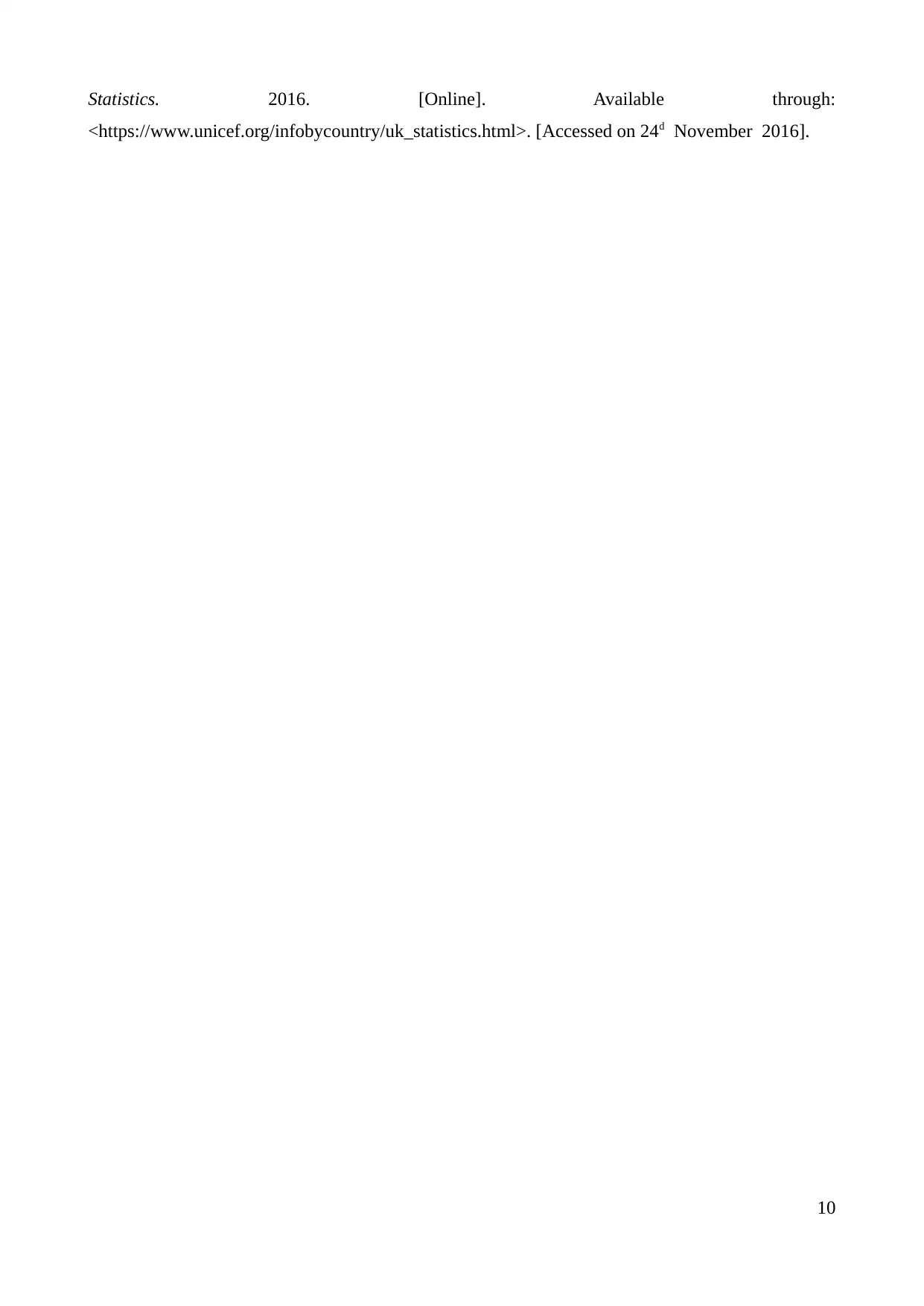
Statistics. 2016. [Online]. Available through:
<https://www.unicef.org/infobycountry/uk_statistics.html>. [Accessed on 24d November 2016].
10
<https://www.unicef.org/infobycountry/uk_statistics.html>. [Accessed on 24d November 2016].
10
1 out of 10
Related Documents
Your All-in-One AI-Powered Toolkit for Academic Success.
+13062052269
info@desklib.com
Available 24*7 on WhatsApp / Email
![[object Object]](/_next/static/media/star-bottom.7253800d.svg)
Unlock your academic potential
Copyright © 2020–2026 A2Z Services. All Rights Reserved. Developed and managed by ZUCOL.



